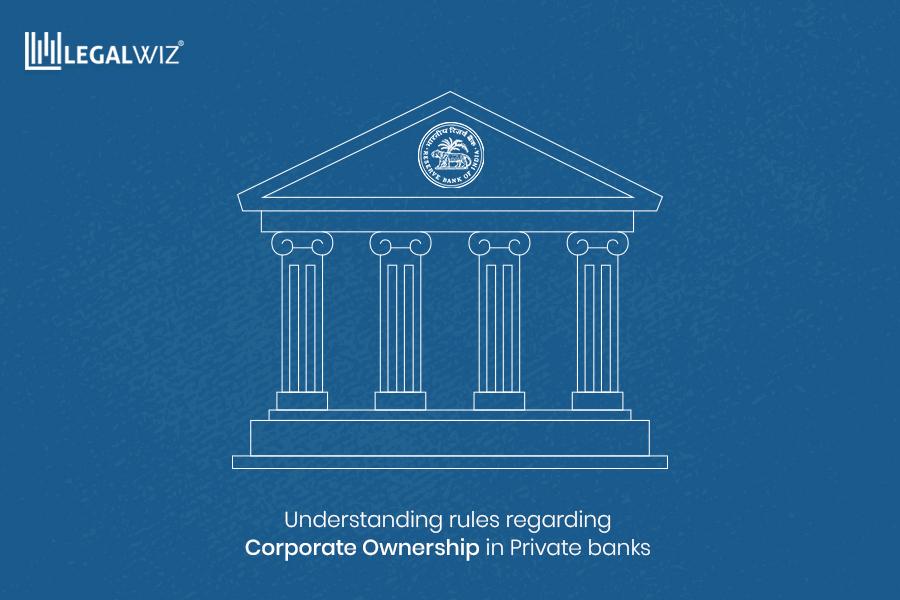Understanding Rules Regarding Corporate Ownership In Private Banks

RBI (reserve bank of India) has released its internal working group report to evaluate extant corporate ownership guidelines and corporate structure for Indian private sector banks. Various articles and commentaries have also come up related to it. But first, all the business and corporate houses must abide by the laws. As a company, you should register your company. Suppose, if you choose the LLP registration for your business form, then you should register a private limited company as per the companies act which is incorporated under the ministry of corporate affairs.
What has attracted public attention has been a top-notch recommendation that allows banks to grant banking licenses to business houses, convert payment banks to small financial banks, and in due course universal banks and that large (NBFCs) non-banking finance companies are enabled to convert into universal banks. A tremendous barrage of such articles and commentaries have been analytical to those recommendations and raises the concerns about the plutocracy that possesses everything from operating banks to owning it.
Governor of RBI (reserve bank of India) has also noted that India’s reserve bank takes no firm position on this particular matter and treats IWG’s (internal working group) views and recommendations as peculiar from that of the reserve bank of India. While a lot has been written on this subject, I am taking up the gauntlet by adding my views to numerous opinions and giving it a kind tone.
The numerous arguments concerning the entry of business houses into banking are that the Indian economy requires more credit and capital to push the growth curve. It is believed that giant corporates with full pockets are the ones who can infuse the financial resources in India’s growth and thus, allow them to do so. This argument is misleading as many giant corporate houses are filled with debts, and the full pockets narrative, in reality, is a borrowed money. There are few suggestions given down below if we really are considering allowing the entry of giant corporate houses into the banking sector.
First, only business or corporate houses (across all the firms consisting of the business house) that do not have any debts and have sufficient cash should be considered to grant banking licenses. If they do not meet such criteria, then they are not allowed. A business or a corporate house only being net debt-free is not sufficient, since that still infers that a business is built on the debts.
Second, such debt-free status could be for at least a quarter or four or five years (if we are to see the look-back period) and a vital undertaking to stay debt-free through the time business or corporate house remains a promoter owns fifteen per cent of the share capital of the bank (or the non-operating holding company).
Further conditions can be imposed such as they cannot be a credit support provider (they must not issue guarantees or letters of comfort) or a credit reference (being a guarantor in securitization transactions or factoring transactions), nor carry out any leading or investment business (including by deployment of surpluses into debt or equity instruments, inter corporate deposits, in mutual funds or securities) via any other entity. This would also make sure parity in between existing banks that have boundaries and limitations on investing and lending, and make sure of allowing breathing space amongst banks.
Any lending, borrowing or investing activity for and by the business house must be to conserve the bank established by it, paraphrasing the adage here, “neither a lender nor a borrower nor an investor be if you would want to have a banking business” to make the point clear.
Such business or corporate houses must not be allowed to be providers or suppliers of any service, equipment, property, technology or outsourcing services to the bank or any other banks. They can only contribute to management and capital. A bank has to be self-sufficient in all aspects. It should only engage with independent third-party service providers who also state that they have no business or corporate house engagement that leaves banks at risk of penalties and claw-back if the opposite is established later.
The recommendations mentioned above are to banish indebted business or corporate houses from getting banking licenses. It also makes sure that they will not get any lending or competing with banks or will not be allowed to carry out any transactions among them to clog the financial flow.
The recommendations mentioned above coupled with the clean baking record, necessary changes to banking regulations act or the RBI act that enables the RBI absolute authority to examine, inspect and probe and or all entities of business or corporate house and their dealing, to initiate requisite action in case of finding any defaults and other supervisory powers should be the minimal for business or corporate houses being enabled into the banking business.
Giant NBFCs are becoming banks – IWG also signalizes that giant NBFCs can become banks. The above approach must be applied to convert banks into NBFCs possessed by a business or corporate house.
Also, check- Why Makeup boxes are Crucial to Your Cosmetic Business?
Privatizing the public sector banks or recover weak banks or to convert payments banks into small finance banks or into universal banks – likewise, the above approach must be applied in all the cases, if a business or corporate house are eager to partake in privatization opportunities, recovering a weak bank or if they possess payment bank licenses and want to convert them into small finance banks or universal banks.
Final ownership levels – ownership limitation by a single shareholder or a group must be limited at fifteen per cent as it is in the corporate law sphere. Shareholding more than 25% offers a veto on proposals that need approval from the three-fourth majority. By mentioning in the AoA of the bank (or its non-operating holding company) that even mundane matters need three-fourth majority could result in the business or corporate house remaining established, which can be detrimental to the public deposits taking institutions. Thus, restricting eventual shareholding to fifteen per cent as at present or at best increasing to twenty per cent and enabling any special rights in the AoA can be something to think upon.
Due timetable to ensure that the shareholding is brought within these limitations must be part of licensing norms. If extended to meet the adherence to limits then license conditions should also think about treating any surplus or capital gains emerging as unearned income or as acquired unjustly and a percentage of which should be paid over to public exchequer by way of recompense, disgorgement or restitution instead of allowing the business or corporate house to benefit from its own unpunctuality in abiding by the agreed-upon disinvestment timetable.













